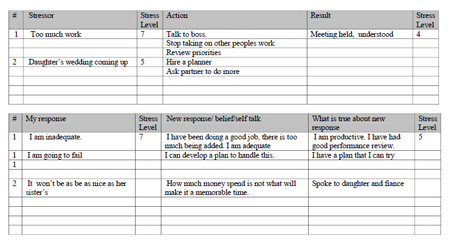Articles
Stress and Stress Management
By Peter S. Silin, MSW, RSW
People often talk about being stressed, and about managing stress. I think it helps to take a closer look at what stress is.
Stress is, in some ways, a psychological/physiological response to stimuli. The stimuli can be externally or internally generated. For instance, it could be a colleague at work, or it could be worry about an exam.
The important thing to focus on is that stress is a response to something. It manifests as worry, fear, anxiety, anger, depression, and so on. There are stressors, and there are stress responses. This gives you a couple options. One, you can manage your response or you can manage the stimulus.
Managing the stimulus might mean talking directly with your colleague, or studying for an exam, speaking to the professor of the course, or avoidance. Managing the stimulus might also entail managing what it means to you and why.
Managing your response would entail doing something so that you are not worrying, afraid, etc., or those feelings are lowered to a level which you consider tolerable.
There are a number of techniques to do the latter. These include creative visualization, meditation, yoga, journaling, finding support and talking to friends, going to the gym, hot baths, etc. Part of what I do is people learn these techniques or develop an action plan for them.
Another way to manage your response is to think about what it stimulates in you about yourself. This entails understanding some of the ways you think about yourself in your world: the shoulds. For example, I should be able to handle all of this. I should be a better wife. I should be better at this. I should learn this faster. These are the thoughts which stimulate stress in you about yourself. They create a gap between your shoulds, and what is possible for you or what you are doing. You will need to understand and change some beliefs about yourself and your world or develop an action plan that will help you to accomplish what you are setting up for yourself. When those change, the pressure is lower. The stressor events may still be there, but you will not experience them as stressors because you will a different way to handle them or you will have given them a different meaning. If you do, you will not respond with such a strong stress response.
For example, if you believe you should be able to handle the pressure your boss is putting on you. New ways to think about this may be, "I am doing a good job. My boss is stressed and putting it onto me. " Or, "I can learn to do this, but it will take some time.I will write out a plan." Or, " I do not deserve this kind of treatment. I am handling my tasks well, but I will need a plan to deal with my boss." These replace the dysfunctional thoughts you are having , and which not only do not help you, but cause you to feel worse and sometimes helpless.
Below are two tables with examples you can use to help you manage the stressors and your responses. As you use the actions, update the response levels before and after.
Click on the small version of the tables image to open a full size version in a new window/tab.
If you find that you need more help, it may be that the stressors are causing you so much anxiety that you need to learn more skills to lower anxiety. These are the skills that focus on relaxation, breathwork, mindfulness and visualization.
One of the reasons people come to see me is to help them learn and use techniques to manage their stress responses and to understand what they are doing that is creating and maintaining them. The other part of this to look at what it is about the stressor which is leading you to have a stress response. For example, it may remind you of someone you knew in the past or something that you experienced in the past. A situation may resemble a situation that you have been in at some point, and which was difficult for you. This often is what happens during relationship issues. When you change your perceptions about the stressor (in this case also meaning a situation), you may not have the stress response, or it will not be as strong. With a deeper understanding of the stressor, you can have some choice about how you respond. In time, this can become your primary response to this, or similar situations.
Updated September 2014
How To Contact Us |
|
| Tel: 778-885-5695 Fax: 604-874-7725 |
|
| Email: info@counsellor-coach.ca | |
288 West 8th Ave,. Vancouver, Canada V5Y 1N5
=> click here to view map <=
© Copyright Peter Silin - Counsellor-Coach.Ca - 2004. All rights reserved.
|


